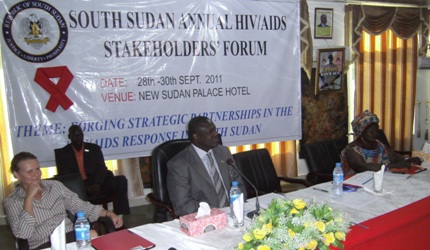South Sudan’s leadership urges for scaling up of HIV services
September 29, 2011 (JUBA) – The leadership of the newly independent South Sudan has stepped up the fight against the killer disease, HIV/AIDS, in consolidation with the stakeholders.

Hundreds of representatives from various institutions and organisations gathered during the event to deliberate on the strategies aimed to effectively curb the spread of the disease.
In his statement while launching the event, the Vice President of the Republic of South Sudan, Riek Machar, urged the concerned institutions and partners to scale up HIV services based on need, while targeting rural areas where the majority of the people live.
He said in order to consolidate peace in South Sudan, the SPLM-led government had realized that HIV/AIDS needed to be tackled early and decisively, thus setting up the commission to initiate and recommend policies and strategies for curbing and combating the spread of the disease and create general awareness to the whole society.
Machar commended the event, saying it provided a forum in which to update on how the disease is progressing or digressing at international, regional, national and community levels as well as share experiences on what has worked and what has not worked well so as to avoid repeating mistakes.
He stressed the importance of promoting partnership in the fight against the disease. “We should aim to promote partnerships drawn from national, regional and international levels, including government, civil society organizations, key private sector organizations, multilateral and bilateral institutions and academia,” he said.
He further underlined that without the involvement of the civil society, the effectiveness of the work would be compromised.
The Vice President also called upon all leaders at national government, state and county levels including ministers, commissioners, chiefs and religious leaders to include HIV/AIDS in all their messages wherever and whenever they get a chance of addressing people.
“I encourage you to continue supporting us so as to reach communities with HIV messages and reduce this stigma attached to the disease…It is only in this way that we will be able to instill a caring attitude among ourselves,” he said.
He revealed that the government has availed 35 million South Sudanese pounds for the HIV/AIDS program this year.
He added that new guidelines will soon be launched for an effective multi-sectoral response to HIV and AIDS and urged the stakeholders to use the guidelines, and not forget them in shelves or drawers, while implementing the response to the disease.
The Vice President also thanked the partners to the government in the fight against the killer disease.
“All these activities and more could not have happened without the support from our partners and I would like to take this opportunity to thank all those who have stood by the SSAC to develop, coordinate and implement an expanded HIV response to this date.”
HIV/AIDS has already infected and affected over a hundred thousand people in South Sudan, according to official statistics, with Western Equatoria state leading followed by Central Equatoria state.
ST
